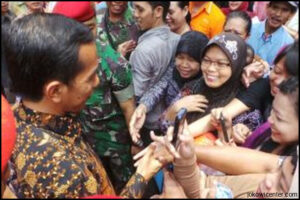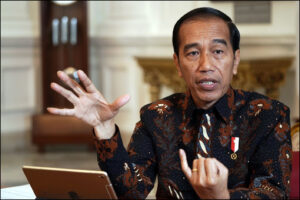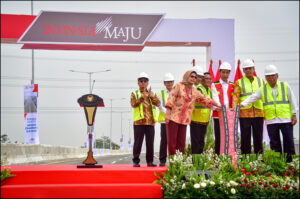Prabowo vs Jokowi: Priayi vs Wong Cilik
Introduction
In the realm of Indonesian politics, the rivalry between Prabowo Subianto and Joko Widodo, commonly known as Jokowi, has captured the attention of the nation. This article delves into the clash between these two figures, highlighting their backgrounds, political ideologies, and contrasting approaches to governance. The battle between Prabowo and Jokowi represents more than just a contest for power; it reflects a broader struggle between traditional elites and a new generation of leaders.
The Rise of Prabowo Subianto: A Journey of Power and Influence
Born into privilege as part of the Indonesian nobility known as priayi, Prabowo Subianto had a head start in his pursuit of political power. With a family lineage deeply entwined with politics and military affairs, he developed an early interest in both fields. Building on his prestigious pedigree, he embarked on a career in the military and rose through the ranks with remarkable speed.
Prabowo’s military background shaped his worldview and instilled in him a strong sense of nationalism. His charismatic leadership qualities coupled with an uncompromising stance against corruption won him admirers among both conservatives and nationalists. However, detractors argue that his confrontational style often reflects an authoritarian streak.
Despite experiencing setbacks early in his political career due to controversial episodes during Suharto’s regime, Prabowo reinvented himself as a nationalistic figurehead representing conservative forces in Indonesian politics today. His popularity lies primarily within rural communities where traditional values are still upheld.
The Political Persona: Strongman or Nationalist?
Known for his fiery rhetoric delivered with conviction, Prabowo Subianto has often been labeled as a strongman. His appeal lies in projecting strength and decisiveness, qualities that resonate with segments of society yearning for a leader who can provide firm guidance in times of uncertainty.
However, Prabowo himself staunchly identifies as a nationalist, championing causes related to preserving Indonesia’s sovereignty and protecting the country’s cultural heritage. This dual identity as both a strongman and nationalist creates an intriguing juxtaposition that has further fueled his popularity, particularly among those seeking stability.
Jokowi: The Common Man Ascends
In stark contrast to Prabowo’s noble lineage, Joko Widodo, affectionately known as Jokowi, rose to prominence from humble beginnings. Born and raised in the small town of Solo, he initially made his mark in the business world before venturing into politics.
Jokowi’s background as “Wong Cilik,” or the common man, resonates deeply with the Indonesian population. He represents a new breed of leaders who eschew traditional power structures and favor grassroots approaches to governance. Jokowi’s political rise is intrinsically linked with his reputation for being hands-on and close to ordinary citizens.
The People-Centric Reformer
Jokowi’s approach to governance centers around people-centric policies aimed at improving the lives of ordinary Indonesians. His tenure as Jakarta’s governor showcased his commitment to tackling pressing issues such as urban poverty, infrastructure development, and social welfare programs.
What sets Jokowi apart is his emphasis on tangible results rather than grandiose promises. By prioritizing projects that have a direct impact on people’s daily lives, he has managed to maintain high approval ratings throughout his presidency despite facing numerous challenges along the way.
Clash of Ideologies: Traditional vs Progressive
Prabowo and Jokowi embody distinct political ideologies that are at odds with each other, leading to a clash of ideas and visions for Indonesia’s future.
Prabowo’s Conservatism: Balancing Tradition and Progress
As a representative of the priayi class, Prabowo champions conservative values and aims to strike a balance between tradition and progress. He believes in upholding cultural heritage while embracing modernity, providing stability without stifling growth.
This approach resonates with segments of society that yearn for a return to traditional norms. However, critics argue that his conservatism may hinder necessary social reforms and fail to address pressing issues such as inequality and human rights concerns.
Jokowi’s Progressivism: Embracing Change for a Better Future
Jokowi’s progressive ideology is characterized by his commitment to modernization, inclusivity, and social justice. He sees Indonesia as a diverse nation requiring an inclusive approach that accommodates all citizens’ interests.
His focus on empowering women, economic equality, and environmental sustainability sets him apart from the more traditional vision espoused by Prabowo. While many applaud Jokowi’s progressive agenda, others remain skeptical about his ability to implement substantial changes in the face of political obstacles.
The Battle Continues: Key Takeaways
The contest between Prabowo Subianto and Joko Widodo represents more than a simple rivalry for political power; it reflects deeper ideological divisions within Indonesian society. This clash between the priayi-class conservatism embodied by Prabowo and the progressive vision championed by Jokowi highlights two vastly different paths forward for the country.
As these two figures continue their political battle, Indonesians are left with an important decision: whether to place their trust in the traditional elites represented by Prabowo or embrace the new generation of leaders like Jokowi, who advocate for change and inclusivity. The outcome of this ongoing rivalry will undoubtedly shape the direction of Indonesian politics for years to come.





